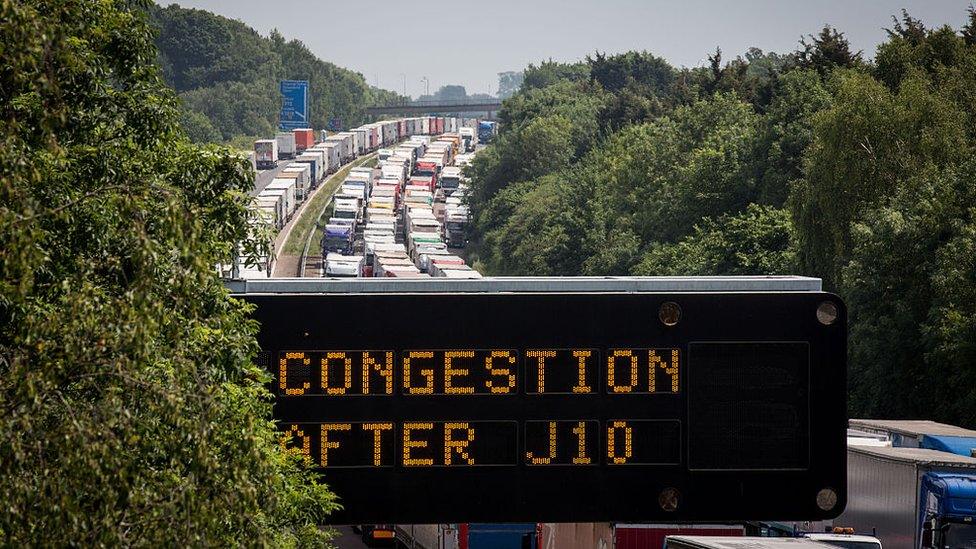Dover delays: Could they become the norm?
- Published
How will the Port of Dover cope with Brexit?
Operation Stack. Every day. For perpetuity.
That was the stark warning sent by the head of the Port of Dover to UK and European politicians on the eve of Article 50.
That is the trigger that fires a two-year countdown for the beginning of the end of the UK's membership of the European Union and with it the border agreements that put European goods on UK shelves and vice versa.
His warnings are not the ravings of a Brexit pessimist. They are a clear message to governments, both here and in France, that the cost of failure in agreeing new rules in the currently frictionless movement of stuff between here and our biggest trading partner, the EU, could be severe.
The EU's chief negotiator, Michel Barnier, has already highlighted customs checks as a key obstacle to trade. Tim Waggott, the CEO of the port of Dover is confident that a clear and sensible solution is available.
"The answer is some form of passport for goods, a technology-based solution that effectively gives us advanced information about what is moving from where, and to where."
The alternative could be grim. During French industrial action and occasional bursts of bad weather in the English Channel, this major artery of trade (17% of all traded goods in the UK arrive or leave through Dover) has suffered blockages which have clogged the bloodstream of the UK economy.

Tim Waggott said the consequences would be nationwide.
"The Armageddon scenario would be jobs being lost in the Midlands Engine or the Northern Powerhouse. In 2015 we saw Operation Stack in place for an unprecedented 30-plus days. We will see that every day of the year, in perpetuity, if we don't get this situation sorted."
'Transitional arrangement'
It's not a question of whether you are pessimistic or optimistic about the UK's prospects outside the EU. It's not something measured against long-term ideology but now measured against the clock. If proper negotiations don't start soon, time to sort these practical border issues will slip through the hourglass.
That is time that Tim Waggott doesn't believe we have and requires an early acknowledgement that we can't set sail off a cliff.
"Two years isn't a long time, IT systems take a long time to deliver. Certainly we will need some sort of transitional arrangement to make this work."
That idea is unpopular with many Brexiteers as it's seen to encourage procrastination - a sort of negotiating purgatory which will delay ad infinitum and ad nauseam the clean break they prefer.
For those who live anywhere near Dover, Operation Stack needs no explanation - a backlog of HGV vehicles which backs on to the M20 and severely interrupts traffic in the transport intensive South East. It also costs manufacturers and retailers who rely on "just in time" deliveries of everything from car components to cabbages.
No-one wants that scenario. Given the two-way trade, long queues of lorries in Dover mean long queues in Northern France. The mutually assured trade destruction that failed negotiations would bring about should sharpen pragmatic instincts on both sides of the table.
The problem is time. That is one commodity already in short supply.
To use Nick Clegg's analogy, European negotiations are often like a Rubik's cube. It's not done till it's all done. Nothing is agreed till everything is agreed. Add that thought to the reality that there are crucial elections in France and Germany in the next few months and it seems unlikely that the important business of trade with the UK will eclipse European leaders' first priority to stay in power.
'Terrible shame'
Some business leaders see the triggering of Article 50 as an overdue call on UK business to focus on faster-growing markets beyond the EU. Sir James Dyson, of the fast-growing electrical products company that bears his surname is clear.
"Europe is important but it's only a part of the market. What is much more important is the rest of the world… I am a patriot, which is why I'm keen to reconnect with the Commonwealth. These are people who supported us in the last world war and on whom we turned our backs in the 1970s (when we joined the EEC). I think that was a terrible shame."
He is putting his money where his mouth is - investing £2.5bn over the next five years in new facilities in Wiltshire to double his 3,500-strong workforce and a business seeing sales grow at 40% year-on-year.
Critics say that his business model suits a Commonwealth-friendly sales pitch. Dyson vacuums, fans and hairdryers may be designed in the UK but they are built in the Far East. He may be cleaning up around the world, but for businesses that rely on obstacle-free access to Europe, preventing any blockages will be of paramount importance.